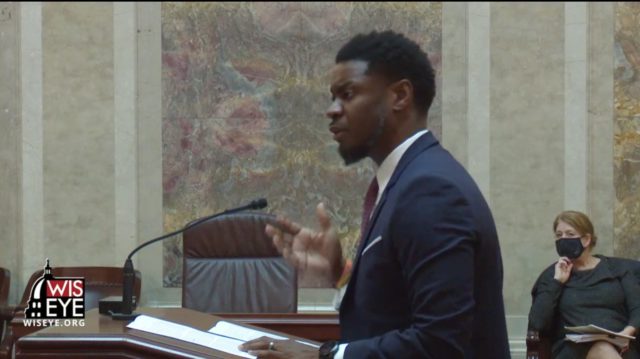The Wisconsin Supreme Court on Tuesday prohibited state courts from indiscriminately shackling juvenile defendants during court proceedings, requiring courts instead to create policies to restrain children in court only when necessary.
“It’s a great day for children,” said Judge Everett Mitchell, the presiding judge of the juvenile court in Dane County and one of the authors of the petition adopted by the state’s highest court.
According to a memorandum in support of the petition, 25 Wisconsin counties use handcuffs, leg chains, belly chains or a combination of methods to restrain all juvenile defendants who come from detention centers to their hearings, which has a dehumanizing effect, advocates said in a hearing on the petition Tuesday morning.
Under the new rule, which will go into effect July 1, courts will be required to presume children do not require restraints in court and demonstrate a compelling reason to restrain them, which could include a threat to the safety and security of the court or a flight risk.
Mitchell told the court that he first started thinking about the issue in 2016, shortly after he was elected to the bench.
“I started to pay attention to all the ways and conditions in which children were being brought into my courtroom in handcuffs and restraints,” he said. “I am very intentional when I use the term children because various systems have a temptation to turn children, especially children of color, into super predators. I immediately started to witness a pattern of my traumatized Black, brown and white children consistently brought from the detention center to the courtroom under the presumption that they needed to be restrained in order to participate in the hearing.”
Mitchell chaired a committee to examine the practice of restraining all children in court, which has changed that practice in Dane County over the last five years, now restraining only those young people who are volatile or likely to try and flee from court. Mitchell told the seven Supreme Court Justices that Dane County Juvenile Court has had no safety concerns as a result of this change in policy.
“Since then judges and court commissioners have conducted thousands of hearings without handcuffs or restraints. Neither the safety of our courts, our staff, nor our children have been compromised … This way, young people are engaged. Young people are vocal. They’re thoughtful. They’re angry, but respectful. And they leave the courtroom hopeful.”
Milwaukee County Judge Laura Crivello, another author of the petition, said restraining children in court can inhibit rehabilitation.
“If a youth holds the perception that they are not being treated fairly, they will not trust the court proceedings, which in turn will hurt the youth’s rehabilitative efforts,” Crivello said. “Adolescents who perceive their involvement in the criminal justice system as fair have lower rates of recidivism. We need youth to recognize their potential and what they have to give to society, and wrapping a child in chains does not further that mission.”
Retired public defender Eileen Hirsch noted that adolescents are still forming their identity.
“When they are brought into a courtroom in shackles … they believe that the court is seeing them as criminals who are dangerous and have to be shackled,” she said. “They may think, ‘maybe that’s what I am,’ and try out that identity and go out and commit crimes in keeping with their new identity. The other thing that happens, and I think this is even more important, is that they feel like they are presumed guilty. We tell them they’re presumed innocent, but it’s a case of actions speaking louder than words.”
The memorandum in support of the petition also noted that 33 states had already moved through court order or legislation to limit the practice of automatically restraining children in court.
Several justices noted that no law enforcement officials, such as sheriff’s offices or district attorneys, had weighed in on the issue, even though the court had sought their input. No speakers opposed the rule change, nor did any of the 17 submitted briefs, letters and statements from judges, experts, attorneys and other stakeholders.
The Supreme Court vote count was not immediately available Tuesday afternoon.




























